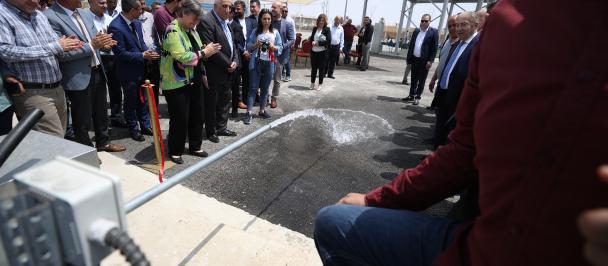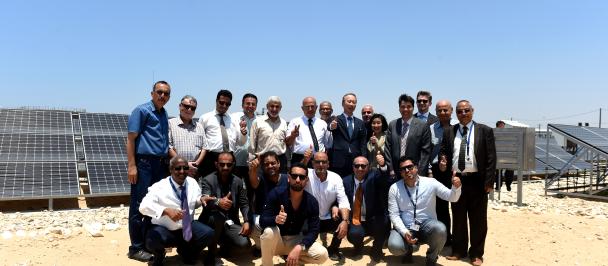PRESS RELEASE
New Agreement between UNDP and Kuwait Fund Supports Emergency Water Project to Deliver Safe Drinking Water to Displaced People in Gaza
April 30, 2025

Children in Gaza waiting desperately in lines to get drinkable water
East Jerusalem, 30 April 2025- The United Nations Development Programme (UNDP) and the Kuwait Fund for Arab Economic Development (KFAED) signed a new agreement to support an emergency project enhancing access to safe drinking water for approximately 200,000 Palestinians in the Gaza Strip. The initiative targets internally displaced persons and vulnerable communities in Rafah, Khan Younis, and Gaza City.
Abdallah Al Dardari, UN Assistant Secretary-General and Director of the Regional Bureau for Arab States, UNDP, and Waleed Sh. Al-Bahar, Acting Director-General of KFAED signed the agreement, which comes at a critical time, as Gaza faces one of the world’s most acute humanitarian crises, with severe water shortages impacting public health, livelihoods, and stability.
“The collaboration agreement that we signed today with the Kuwait Fund does not only represent a response to urgent needs. It signifies a reaffirmation of our shared commitment to investing in human dignity and resilience,” stated Al Dardari. “Together, we are ensuring that communities in Gaza have access to one of the most basic and essential rights—clean and safe water.”
"This initiative lies at the heart of the State of Kuwait's steadfast commitment to alleviating humanitarian suffering and improving living conditions in the Gaza Strip,” emphasized Al-Bahar. " The significance of this agreement stems from addressing an urgent humanitarian need, particularly in light of the severe conditions faced by Gaza’s residents, including interruptions to basic water supplies and reliance on contaminated sources that threaten public health and contribute to the spread of diseases."
Sarah Poole, UNDP’s Special Representative of the Administrator for the Programme of Assistance to the Palestinian People, noted, “Implemented over a 12-month period, this project aims to address the urgent humanitarian need for potable water while establishing foundations for sustainable, long-term solutions. It is part of UNDP’s broader emergency response and early recovery interventions, as part of the UN’s overall response, designed to help communities withstand compounded challenges of displacement, infrastructure destruction, and resource scarcity."

From the signing between UNDP and Kuwait Fund to support emergency water project to deliver safe drinking water to displaced people in Gaza
The project will include comprehensive assessments of proposed wells and water tanks to identify maintenance and installation needs for mobile water desalination plants. Following this evaluation, essential maintenance activities will commence at selected well sites. Mobile desalination plants, each capable of producing 250 cubic meters of water per day through reverse osmosis technology, will be installed and commissioned. To ensure uninterrupted operation, solar energy systems providing 30 kilowatts per hour will be installed at each plant, ensuring at least six hours of daily operation, supplemented by 25 KVA diesel generators to extend operational capacity during power outages. Additionally, existing water networks will be rehabilitated and maintained to enhance distribution efficiency.
Beyond immediate humanitarian relief, the project aims to safeguard public health, improve hygiene standards, and strengthen community resilience. This initiative reflects UNDP’s commitment to delivering integrated water, sanitation, and hygiene (WASH) solutions, linking emergency assistance with sustainable development to protect the dignity and well-being of Gaza’s communities, in coordination with the WASH cluster and partners.
The signing of this agreement reinforces the deep and longstanding partnership between UNDP and the Kuwait Fund, reflecting their shared commitment to resilience and sustainable development in crisis-affected regions.
For further information, please contact:
Musa Khalil | Head of Communication Unit | E-mail: musa.khalil@undp.org | Tel: +972 6268200, Mobile: +972 5748761
For more information about UNDP/PAPP visit www.ps.undp.org

 Locations
Locations
